|
WASHINGTON—The Lao Hmong refugee who documented an alleged massacre of five Hmong children by Lao troops has described in detail how the children were attacked and raped by Lao troops before he returned and photographed their mutilated bodies. In a lengthy interview with RFA’s Lao service, Va Cha Yang, a merchant who smuggled video footage of the children’s bodies out
Sunu Maya Rai was behind bars when she was barely two years old. She spent eight years of her life in Khotang Jail, and was the only child resident there. No, she did not commit any crime, not even an accidental offence. Her father was the convicted one. And by default, she too had to share his sentence. She remembers how her heavily shackled father, with chains dangling all around, had to carry her on his back to hospital when she fell sick. She recalls, “It was just me and my father and the ‘bhat’ he cooked for us”. Precious few were the occasions when she was allowed to go and play with the local children outside the jail. “Those times were the happiest.” After eight lonely years of sleeping on a piece of foam spread on the craggy prison floor in remote Khotang, it has now been four years at a cozy foster home in Kathmandu. Sunu Maya still has no idea what her father was sent to prison for. For ordinary children, the very word ‘jail’ sends chills down the spines. What must it be like to literally live inside one! Further investigations unleashed more surprising realities.
BAGHDAD (AFP) - The US military released 275 detainees Wednesday from the notorious Abu Ghraib prison centre as part of the first wave of prisoners released by a new Iraqi-US commission, the military said. "The release today was approximately 275, with 25 of those being juveniles," said Lieutenant Colonel Barry Johnson. The detainees' cases were all reviewed by the new nine-member Combined Review and Release Board. It includes six Iraqi officials - two each from the justice, human rights and interior ministries - and three colonels from the US-led multinational division.
Cason had the replica built based on details sent by jailed Cuba dissident physician Oscar Biscet to show the conditions political prisoners are held under. The Cuban government denies having political prisoners and mantains that dissidents are working on the payroll of it's arch enemy, the United States.
363 of Pakistanis were released from an Afghan prison Sunday — after being jailed for three years as prisoners of war, a step meant to amend strained relations between the two countries. The Pul-i-Charki prison just outside Kabul is one of the biggest prisons in the world, with a capacity of 20,000 prisoners. The 368 prisoners, captured during the oust of the Taliban, were being driven by bus 155 miles to the Pakistani town of Peshawar for screening by Pakistani authorities. "We are glad that their ordeal is finally over," said Pakistani embassy third secretary Zafar Ali Khan. "We have been trying to get access to them for a long time. We believe there has been no need to have kept them for so long in Afghan jails." The prisoners range in age from 22 to 60. "They could have done this much sooner," Pakistani Ambassador Rustam Shah Mohmand said of the prisoner release by Afghanistan. "Still, I appreciate it, and the Afghan and Pakistani governments want to have good relations."
An investigation by China's top judicial body has uncovered more than 13,961 prisoners who have had their jail terms illegally reduced in the past four months by corrupt prison officers. The Supreme People's Prosecutors' Office made the discovery during a study of the country's prison system, which also found another 3,875 prisoners were released on parole or received medical treatment while on bail. The SPP said 42 law enforcement officers have been found guilty of reducing prison terms. An investigation was launched based on suspicions guards were accepting bribes in exchange for shortening prisoner's sentences.
Peter is admired by scores of detainees for the selfless assistance he's given them in their own battles with paperwork and bureaucracy, and valued by dozens of Australian friends for his extraordinary wit, intelligence and resilience. But nobody can face life imprisonment for no reason. As Peter once said, even Nelson Mandela in prison had the struggle for his nation's freedom to give him strength, but his own suffering serves no purpose for anyone. He is locked up, apparently forever, because of lost paperwork in India, and a file full of minor errors and misunderstandings in Australia.
Hicks also told his father during their brief emotional reunion in Cuba last week that he was sorry for all the trouble he had caused, The Sunday Telegraph reported. Terry Hicks said he was angry at Australian government claims that his son was not abused by his US captors, the paper reported. Seventy Nepalis prisoners are stuck in the Thai jails in the absence of an extradition treaty between Nepal and Thailand, a report said. Most Nepalese were imprisoned in Thailand on charges of drug trafficking, the report added. According to The Rising Nepal, the Thai government had back in 2000 handed a proposal to Nepal, asking it to sign an extradition treaty. However, Nepal is still engaged in arranging the necessary groundwork. We have been working for the transfer of the Nepalis held in the Thai jails. The legal formalities that need to be completed will take a long time,? the daily quoted minister of state for foreign affairs Prakash Sharan Mahat as saying.
Mann, wearing a khaki prison shirt and shorts, showed no emotion as he stood before Magistrate Mishrod Guvamombe who read out the verdict at a makeshift court in the maximum security Chikurubi prison. "The action by the accused (Mann) amounts at the most to attempting to purchase firearms. The accused is found guilty," said Guvamombe. He said sentences would be handed down on September 10. Mann, a bespectacled former member of Britain's crack Special Air Service military unit was alleged to have been the mastermind behind the suspected plot to overthrow President Teodoro Obiang Nguema of Equatorial Guinea. He was arrested along with 69 other alleged mercenaries on March 7 when a plane stopped off in Harare to pick up weapons that the men claim were to be used to guard a diamond mine in Democratic Republic of Congo (news - web sites). The state has asked for a jail sentence of up to 10 years in prison for Mann, who is also linked to accused coup financier Mark Thatcher, the son of former British prime minister Margaret Thatcher. Guvamombe acquitted 66 other suspected soldiers of fortune Friday, although most of them -- 64 -- and three crew members are still facing sentencing on minor charges of breaching the country's immigration and aviation laws. Two other men described as weapons inspectors who were arrested along with Mann at the airport where they awaited the plane's arrival -- South Africans Harry Carlse and Jacobus Horne -- faced no charges and were to be released later in the day. As the judge declared the acquittal of the 66 men, applause broke out from the small group of family members who attended the hearing. There were tears and a flurry of excited calls on mobile phones outside the prison as relatives broke the news to family members back home in South Africa.
Now that the treaty has been signed, the Council of State will issue recommendations on it and it will be presented to both houses of parliament for tacit approval. The amount of time needed for this procedure will determine when the treaty enters into force. Article 11 of the treaty states that it will take effect when all the formalities relating to ratification have been completed. For more information about the signing ceremony, contact Bart Jochems, Information and Communication Department, Ministry of Foreign Affairs (tel. +31 70 348 6331). For information about the treaty, contact Martin Bruinsma, Information Department, Ministry of Justice (tel. +31 70 370 6266).
A Hong Kong woman who whipped up a media storm last year with a fabricated rape story was among 12,000 inmates released nationwide yesterday to mark Her Majesty the Queen's 72nd birthday. So Leong-ying was immediately deported following her release, said Kanchana Keskarn, deputy director-general of the Corrections Department. So, 30, was sentenced to one-and-a-half-years after telling police that she was raped by a tuk-tuk driver and three other men in June last year. She later admitted fabricating the story. Kanchana said So, who served 14 months, had behaved well behind bars and was among 25,000 inmates who deserved amnesty from Her Majesty. Justice Minister Pongthep Thepkanjana said 12,000 inmates from prisons around the country were released yesterday and 13,000 others would be gradually released over a 60-day period. Inmates released from Bangkok prisons were each given Bt200 by the Po Tek Tueng Foundation and another Bt200 from Pojaman Shinawatra, wife of Prime Minister Thaksin Shinawatra. They also received a travel bag and toiletries. Prison authorities in Solomon Islands say they are working to improve conditions under which inmates are being held. This follows a number of orders by the country's High Court in favour of four prisoner applicants. The prisoners had claimed their detention conditions did not meet minimum required standards, and were unlawful. The Acting Commissioner of Prisons, Francis Haisoma, says all the requirments laid down by the High Court are now being met. He says these included the amount of time availabe for exercise and the provision of certain foodstuffs. Earlier this week, prisoners at the country's main jail in the capital Honiara broke of out of their cells and took over part of the complex in a day-long protest. It required the intervention of local and international police before the situation was eventually brought under control.
"The animals at the Humane Society live under far better conditions than the inmates at Fox Hill Prison," he said. He claimed to have witnessed inmates carrying human waste from their prison cells in garbage bags and the same barrels used to cart out waste were also used to transport food to the inmates. Mr Moss, a corporate attorney, said his interacting with his relative and other prisoners has convinced him that conditions at HMP are "adverse to what is necessary for the rehabilitation of former inmates into the wider society." He feared that a prison that will unleash frustrated ex-convicts into the community perpetuate recidivism. Mr Moss claimed that prison officers are "very demoralised." Their jobs, he claimed, were "hazardous to their health." Mr Moss described the maximum security building as the "most archaic" building in The Bahamas with inadequate lighting and poor ventilation. He claimed lack of fire safety implementations such as fire exits and extinguishers. Mr Moss said he and other lawyers who visit the prison on a regular basis, are obligated to agitate for the amelioration of prison conditions. He blamed himself, lawyers, the media, the judiciary and each government, including the current administration, for "allowing fellow Bahamians to suffer." Asked if he planned to take his complaints directly to the minister in charge of HMP, Deputy Prime Minister Cynthia Pratt, Mr Moss said, "They have access to deeper parts of the prison and know it better than me." Mr Moss proposed, however, what he believed to be the first step towards alleviating problems such as overcrowding. He suggested that The Bahamas adopt electronic monitoring techniques in order to hold prisoners on remand in their homes or to simply condemn unfit prison buildings. He stated that it is not good enough for the government to claim that there is not enough money to affect change in the prison system. Millions of dollars, he claimed, has been wasted on other things. Omar Bradley Smith, deputy leader of the BDM, also present at the press conference, concurred with Mr Moss on improvements needed at HMP. Mr Smith said it was the "moral duty of Bahamians to stand up for these improvements."
COMBATANT STATUS REVIEW TRIBUNALS: Started last Friday. Evaluates "enemy combatant" status of detainees, whether they should be freed. Classification affords detainees fewer legal protections than prisoner of war status. U.S. CIVILIAN COURTS: U.S. Supreme Court (news - web sites) ruled detainees have right to challenge detention in civilian courts. No cases filed yet. Unclear how the U.S. military would accommodate requests. ADMINISTRATIVE REVIEWS: If prisoners determined to be enemy combatants, their detentions reviewed annually to see if they still pose threat or have valuable intelligence. PRELIMINARY HEARINGS FOR MILITARY COMMISSIONS: Scheduled to start week of Aug. 23. Detainees hear charges against them, allowed to make pleas and have judicial procedure explained. Prosecutors and defense attorneys can make various motions before evidence presented. MILITARY COMMISSIONS: Panel hears evidence, arguments in cases of detainees facing charges. Sentences include death penalty. Only four detainees have been charged, 15 designated eligible for trial before commissions.
BEIJING - A Chinese court on Friday sentenced three activists in the independent Protestant church to up to three years in prison for leaking state secrets, a court official and overseas church activist said. The independent church refers to loosely affiliated groups whose followers worship outside the Communist Party-controlled official Protestant church. The court in the eastern city of Hangzhou found Xu Yonghai, Liu Fenggang and Zhang Shengqi guilty of passing on information to an overseas magazine about a court case involving another member of the independent church, the China Aid Association said. Liu was also found guilty of passing on information about the destruction of unofficial churches outside Hangzhou in a crackdown last year, CAA reported. Liu received a three-year sentence, Xu two years and Zhang one year, the group said.
Efi elad was released on the 4/6/04 from Thai Prison of Klong Prem after 6 long months of negotiations. For the purposes of facilitating his release an international fund raising campaign was conducted - resulted with 1/2 a million dollars that helped us to get him out of the prison . The campaign took place in USA\Belgium\England and Israel covered with the media and services such as F.P.S.S as well as with press. The F.P.S.S gives full credit for info and pix to Ilan elhayani, Lawyer & adovocate.
But those women are the lucky ones. Already this year 11 female prisoners in English and Welsh prisons have apparently taken their own lives and campaigners fear that this year will see the greatest number of female jail deaths since records began. It is likely to surpass even last year's record of 14 apparent suicides. The death rate has soared over the past 10 years: in 1994, only one prisoner died at her own hands. "The future is looking extremely bleak," said Deborah Coles of Inquest, which works with families of those who have died in custody. "The current situation is dismal and the end of the year is a particularly vulnerable time for women. We know that prisons cannot keep women safe: it is not just those who are dying, but the high numbers self-harming and attempting suicide every day."
The hearing at the Navy prison camp at Guantanamo Bay, Cuba, is the government's most visible response since a Supreme Court ruling last month granted new legal rights to about 600 foreign-born men held at the U.S. base on Cuba's southeastern tip. Separately Friday, the Justice Department (news - web sites) filed its first detailed response to lawsuits from Guantanamo detainees. The detainees have no constitutional rights, including the right to see a lawyer, the government said in federal court filings. The Supreme Court's ruling gave the Guantanamo prisoners a means to challenge their captivity in federal court, and the government will allow outside lawyers to help them, but that does not mean that wider constitutional protections apply, government lawyers wrote.
Of its 7,000 inmates - mostly drug offenders - 883 have been sentenced to death. Bangkwang is Bangkok's maximum-security jail; designed for lifers and death row prisoners. The Thai people call Bangkwang the "Big Tiger" because it is a man-eater. Scores of prisoners have been put to death in its notorious execution chamber.
The supermarket worker from Bury is just months into a 99-year jail term in Thailand for drug smuggling. Originally sentenced to death, the punishment was reduced to life after he confessed and co-operated with the investigation. He was arrested in November, 2003, after customs officials found 3,400 ecstasy tablets in his travel bag when he arrived on a flight at Bangkok Airport. The pills were hidden in two jars of body lotion Connell said he had bought at a Tesco store in Bury. Now aged 20, he's one of some 7,000 inmates inside Thailand's Bang Kwang Prison. Known in the west as the Bangkok Hilton, it's the most notorious prison in the world. The Real Bangkok Hilton: This World is the result of two years of negotiations between TV bosses and prison authorities. Cameras have been allowed in for the first time to record the reality of life in a prison known to the Thai people as "The Big Tiger" - because it eats men alive.
Nguyen Tuong Van, 23, will appeal against his conviction and sentence in Singapore's Court of Appeal on Monday, in a hearing that is not expected to last even the day. Nguyen, a former salesman, has been on death row for five months since he was convicted of importing nearly 400 grams of heroin in December 2002. He was arrested at Changi International Airport while boarding a Qantas flight to Australia with the drugs strapped to his back and in his backpack. He was in transit from Cambodia, and his trial heard he told police he carried the drugs to repay $30,000 in debts accumulated by his twin brother. The F.P.S.S has just received word today of prisoner releases planned by Taksin's administration, ostensibly around the Queen's birthday on 14 August. On 9 August the first prisoners are due to be released. These will be all those over 60 who have served at least 5 years and have a good prison record. Other releases are due to follow. Most notably, Alan John Davies, now in Klong Prem Central Prison block 1, expects to be released on 9 August. He is over 60, has served fourteen and one half years in Thai prisons, and has an excellent prison record. F.P.S.S wishes to express immediate concern over the processes that has led to the extradition of the 16 Vang Tao Laotians, particularly, given that on December 30, 2003 the Appellate court of Bangkok had ruled "inadmissible" the extradition request filed by the Lao dictatorship. Moreover, these persons had already been convicted in Oubol provincial court [Thailand] of illegally entering Thailand, and all had completed their sentences and were waiting for the reply of the High Commissioner for Refugees on their refugee status application. In that petition submitted to the U.N. High Commissioner for Refugees, the 16 Vang Tao Laotians argued that, if they were returned to Laos, they would face "cruel treatment … to intimidate people who would try to fight the regime, to introduce freedom and democracy."
Human rights campaigners have reiterated their call for end to the death penalty, which they say has proven ineffective in deterring drug dealers and is against the basic human right to live. "There is no empirical data that supports an argument a country which has the death penalty can drop its offending rate lower than countries that don't apply capital punishment," Indonesian Legal Aid and Human Rights Association (PBHI) director Hendardi said on Saturday. Hendardi said only God, not the state, had the right to take peoples' lives. "The right to life is the fundamental right of every human being. (The government) should forthwith scrap any rules legitimizing the death sentence," he said.
KATHMANDU, July 7 (OneWorld) - Authorities in Nepal are alarmed by the burgeoning drug trade, which is fuelling a sharp rise in substance abuse and HIV (news - web sites)/AIDS (news - web sites) in the Himalayan kingdom. Informs the chief of the narcotics and disaster management cell of the Ministry of Home Affairs, Kumar Poudel, "We have noticed a drastic increase in the number of drug peddlers and users." Poudel says nongovernmental organizations (NGOs) and international groups like the United Nations (news - web sites) are aiding efforts to curb the lucrative drug trade in Nepal, where an eight-year Maoist insurgency and political instability have destroyed the economy. Police frequently nab peddlers with hauls of heroin and opium usually headed for foreign destinations where they fetch fantastic amounts. For instance, a kilogram of hashish costs around $90 in Nepal as compared to $5,000 in Canada. Just last week, five women with ten kilograms of hemp were nabbed in Gulmi district, 400 miles west of the capital Kathmandu. Deputy superintendent of police Deg Bahadur GC reveals that his force arrests around a dozen people in possession of varying quantities of injected drugs every month. He adds, "The number of drug addicts has gone up in the city areas, especially in places like Kathmandu, (the eastern town of) Dharan and (the tourist city) Pokhara."
The detainees, some of whom have been held for more than two years, will be told of the new procedures by July 17. They were established in response to a landmark Supreme Court ruling last week that the president cannot indefinitely detain terror suspects without a neutral review. Under the new policy, in an order signed by Deputy Secretary of Defense Paul Wolfowitz, each prisoner will be told the factual basis for his detention -- provided the information isn't classified -- and be allowed to present evidence and call witnesses to rebut it, Pentagon and Justice Department officials said.
Brig. Gen. Charles Jacoby has handed his report to the top American commander in Afghanistan, Lt. Gen. David Barno, for review, a spokesman said. "As soon as we're complete with staffing, we'll be able to release portions of that report," spokesman Maj. Jon Siepmann told reporters. Barno ordered the snap review in May, as the scandal over mistreatment of prisoners in Iraq prompted fresh scrutiny of growing complaints in Afghanistan. Jacoby visited some 20 holding facilities, most of them at bases in the south and east of the country where 20,000 U.S.-led forces are battling Taliban and al-Qaida supporters.
Dr Andrew McLellan, Chief Inspector of Prisons for Scotland, said the problem at Greenock Prison was having a demoralising effect on prisoners.But he praised the jail for addressing almost every concern raised last year. It has experienced no escapes, low levels of violence and a full programme of work and activities for women. Presenting his findings, Dr McLellan said: "Greenock is three different prisons in one. "There are three halls and in each of them the conditions are very different. This overcrowding means that staff have limited time to deal with prisoners
It is with shock, outrage and sadness that the Lao Movement for Human Rights (LMHR) learned of the quiet extradition of the 16 Laotians - arrested following a symbolical taking of control on the 3rd of July 2000 at the Vang Tao frontier post - to the Lao People Democratic Republic (LPDR), whose reputation has been established in Human Rights and Civil Liberties violations. This decision from the Thai authorities, which was ironically taken on the fourth birthday of the Vang Tao operation, first of all comes as a surprise, as on December 30, 2003 the Appellate court of Bangkok had ruled "inadmissible" the extradition request filed by the Lao dictatorship, on the grounds that the alleged wrongful actions of the 16 Laotians were bearing "a political nature". Moreover, these persons had already been sentenced by the Thai justice and had served their sentence in Thai jails, and were waiting for the reply of the High Commissioner for Refugees on their refugee status application. The LMHR is also sad to see that the Kingdom of Thailand, country considered democratic and steeped in Buddhist values, decided to extradite these persons, upon the mere allegation of "illegal entry", to a State denounced by the International Community as a totalitarian, repressive, freedom denying regime towards the Lao people, in particular towards political prisoners and the ethnic and religious minorities of that country. Thus put in the hands of the regime, hands and feet tied, the sixteen extradites have no chance of fighting for their rights, of being granted fair proceedings and a fair trial, of being detained in conditions respecting human dignity and International Conventions.
NEW DELHI, July 04(Online): Pakistani prisoners imprisoned in Indian jails have entered their 10th day of hunger strike and are said to be in critical condition . These prisoners have been on hunger strike for the last ten days and due to their worsening condition, they are admitted in the hospital . The imprisonment period of these Pakistani detainees, who have passed large part of their lives in Indian jails, has been completed long before but their release is far away . On the appeal of these prisoners, the Supreme Court has already issued orders for their freedom . WASHINGTON - The Supreme Court ruled Monday that the war on terrorism does not give the government a "blank check" to hold a U.S. citizen and foreign-born terror suspects in legal limbo, a forceful denunciation of Bush administration tactics since the Sept. 11 attacks. Ruling in two cases, the high court refused to endorse a central claim of the White House: that the government has authority to seize and detain terrorism suspects and indefinitely deny access to courts or lawyers while interrogating them. A state of war "is not a blank check for the president when it comes to the rights of the nation's citizens," Justice Sandra Day O'Connor wrote in the most significant case of the day, a ruling that gives American-born detainee Yaser Esam Hamdi the right to fight his detention in a federal court.
Manuel Vazquez Portal, 52, who suffers from respiratory problems, was one of 75 dissidents sentenced to an average of 19 years in prison after daylong trials in April 2003. "He arrived home around midnight and looked well," said Laura Pollan, wife of still-imprisoned Hector Maseda. Academic Roberto de Miranda, 62, who had been sentenced to 20 years behind bars, was also released on Wednesday. He suffers from a heart condition. The first of the six was released in April and all were conditionally freed for health reasons. An Australian man arrested in Thailand and charged with murder in his home state of New South Wales has been found dead in his Bangkok prison cell. The Department of Foreign Affairs says he died of self inflicted injuries. The body of 41-year-old Emil Chang was found in a cell at Bangkok's Klong Prem prison. Chang was arrested earlier this month after Australian authorities asked for help in his arrest and extradition. He was due to be sent back to Sydney to face charges over a murder three years ago and with engaging in drug dealing. At a media conference after his arrest, Chang strongly denied the charges. He told reporters he was innocent.
Margaret Curran, 53, has for 11 years been a correctional officer at the 8,008-acre Clemens Unit, a 111-year-old prison farm in Brazoria County that now specializes in housing 14- to 16-year-old male offenders who were tried as adults. Curran, who has four children -- a daughter in middle school and three sons, all in college and one also working as a correctional officer -- talked recently with Houston Chronicle reporter Richard Stewart about life on the inside.
But that's not what much of the national news media chose to report. In that document, Bush noted that he believed he had "the authority under the Constitution" to deny Geneva Conventions protection to detainees captured during the campaign that toppled Afghanistan's Taliban regime. But, he added, "I decline to exercise that authority." That, of course, dashes Democratic hopes of proving that the Abu Ghraib prison reflected a campaign of deliberate torture directed by the top levels of the administration. The documents demonstrate that there was intense debate within the administration on what constituted acceptable interrogation methods.
SUNGAI BULOH June 16 - An increasing number of foreigners coming to this country are found to be involved in crimes resulting in local jails and lockups being overcrowded with foreigners. Deputy Internal Security Minister Datuk Noh Omar said 6,597 foreigners were jailed at Sungai Buloh Prison between 2001 and last month while 15,751 foreigners were under remand for the same period. "I have visited Kajang Prison recently. Of the 1,200 women prisoners there, 700 are foreigners. "We have built jails for Malaysians. Now there are more foreign prisoners than Malaysians in our jails and lockups," he told reporters after launching Prisons Department's Warrant Cards at Sungai Buloh Prison, here Wednesday. He said from January to May this year, 65,737 of the two million foreigners in the country were detained for various criminal offences.
Former Saudi prisoner Sandy Mitchell today spoke of his friendship with a US hostage beheaded by al Qaida militants. He described Paul Johnson as "one of the kindest men I have ever known" and recalled how the American and his Thai wife supported his own wife while he was in prison. Mr Mitchell’s comments came as it emerged last night that the al Qaida cell which beheaded Mr Johnson in Saudi Arabia may have been linked to an attack on a BBC crew. Saudi authorities confiscated three cars used by the group, including one believed to have been used in the attack on cameraman Simon Cumbers and security correspondent Frank Gardner. The vehicles were recovered following a gun battle between Saudi security forces and the militants which left four terrorists dead including their leader Abdulaziz al-Moqrin.
Port Elizabeth - Former Eastern Cape beauty Vanessa Goosen is not among the 98 foreigners in Thai prisons who have been granted their freedom as part of King Bhumibol Adulyadej's 75th birthday celebration. Goosen's attorney, Mpumelelo (Bond) Nyoka on Wednesday said he immediately spoke to the Thai embassy upon hearing about the amnesty. "I could cry when I heard she would not be freed," he said. "I am very worried about her and keep praying for a miracle." There are no South Africans among the 89 foreigners - mostly Africans and Asians locked up on minor charges - who were released along with 5 623 Thais on the eve of the king's birthday.
Cape Town - A man has been sentenced to one year in prison in Surinam in South America after being caught with cocaine with a street value of R3.5m. Police officers in the South American country arrested Abraham Nkosi, 37, in December after he took two computers to a courier company. He apparently wanted to send them to Ireland. However, police found 2.3kg of cocaine hidden in the appliances. Nkosi claimed he had only dropped off the computers as a favour for a friend and was not aware of the drugs. But, police found no trace of the so- called friend.
In a letter read to a Sydney rally to mark World Refugee Day, the Baxter detainees said the support from parts of the community was comforting given the nightmare they were living behind the razor wire. "Recently its name was agreed to be Abu Ghraib prison, because all the mistreatment, humiliation and torture that the coalition soldiers have committed against the prisoners in Baghdad have happened in Australia too," the letter, read to the rally, said. "[It's happened] against the ladies, against the children, against the men who came to your land to be safe and far away from any violence, imprisonment or discrimination." The letter's main writer said after four years in detention he understood what humanity, human rights and equal opportunity meant - but he had seen no evidence of it in the way he had been treated.
Maputo - A court in Mozambique sentenced two foreigners - one South African, the other German - to eight years in prison on fraud and drug charges, reports said on Friday. German Josef Landstorfer and South African Basil Davis Granwell were arrested in October 2000, the Mozambican News Agency reported. They were sentenced by a court in the northern province of Cabo Delgado. The two attempted to bribe top officials to secure their release from prison, the report said. - Sapa-AP
That was five years ago. Today, James, 34, is no longer the angry young man who spent the early portion of his incarceration plotting vendetta killings of cops and politicians. He's channelled that anger into a zeal to help rehabilitate persons still in prison, while at the same time warning others of the horrors of jail. "I spent four years and three months in prison. It was a wicked and terrible experience," he says. "Mi wouldn't want even mi enemy to experience what mi go through in prison. I would love other people to hear my opinion and not go down this road." James, who has been on the outside now for just over a year, was actually sentenced to seven years, but was paroled after four-and-a-half years, based on his good behaviour and involvement in rehabilitation programmes.
Human rights groups accused China of failing in its commitment to abide by its international obligations after a visit by a UN human rights expert dealing with torture was called off.
Over two years after being freed from torture in a prison in Laos, Kay Danes is still haunted by the physical and psychological pain she endured for 10 months. While this Australian mother of two recalls being regularly pistol whipped, threatened with death, mocked and ridiculed by her jailers in 2000, her husband Kerry was subject to worse pain in the same jail. "His legs were put in wooden leg blocks that weighed about four to five kilograms (app. 10 lbs.) and (that had) fishing lines in them which cut into (the) flesh," she told IPS. "He was electrocuted and sewage water was thrown down his open mouth as the Lao interrogators tried to drown him." The Danes, who ran a security agency and were caught up in a government dispute with a gem mining company, were freed in 2001, in a case closely followed by the Australian embassy.
Thirty years later, his army long forgotten, Ther still holds out against the government of the Lao People's Democratic Republic. "We thought the Americans would surely come back and help us," Ther says from his jungle hideout in the mountains of northern Laos. "But they never did." Instead, he and a dwindling band of loyalists are battling for survival from continuous government military campaigns, with little assistance from their former paymasters.
Human Rights First, formerly known as the Lawyers Committee for Human Rights, said in a report that secrecy surrounding these facilities made "inappropriate detention and abuse not only likely but inevitable." "The abuses at Guantanamo Bay and Abu Ghraib cannot be addressed in isolation," said Deborah Pearlstein, director of the group's U.S. Law and Security program, referring to the U.S. Naval base prison in Cuba and Abu Ghraib prison in Iraq (news - web sites) where abuses are being investigated. "This is all about secrecy, accountability and the law," Pearlstein told a news conference. The report coincided with news that Defense Secretary Donald Rumsfeld ordered military officials to hold a suspect in a prison near Baghdad without telling the Red Cross. Pearlstein said this would be a violation of the Geneva Conventions and Defense Department directives. She said thousands of security detainees were being held by the United States in Iraq and Afghanistan (news - web sites) as well as locations elsewhere which the military refused to disclose. "The U.S. government is holding prisoners in a secret system of off- shore prisons beyond the reach of adequate supervision, accountability of law," said the report.
"It's called slavery," Secretary of State Colin Powell said Monday in recounting Khan's fate as he released the State Department's annual report on human trafficking. He said the practice affects 600,000 to 800,000 persons each year. "We're talking about women and girls as young as 6 years old trafficked into commercial sexual exploitation, men trafficked into forced labor, children trafficked as child soldiers," Powell said. In trying to encourage governments to confront trafficking problems, the State Department holds out the possibility of sanctions against those which fall short. On this year's list of offenders are Bangladesh, Burma, Cuba, Ecuador, Equatorial Guinea, Guyana, North Korea (news - web sites), Sierra Leone, Sudan and Venezuela.
For a while this week, it appeared her long and terrifying ordeal might be over. It seemed almost certain the 49-year-old San Diego woman sentenced to five years in a Mexican prison for carrying prescription drugs would finally win her freedom. She did not. In a stunning development, a Mexican appeals court rejected her challenge - her last stop in that country's judicial system, effectively sealing her five-year prison term.
Russian Federation: Amnesty International calls for the release of Igor Sutiagin from prison pending retrial On 5 April 2004, the Moscow City Court found Igor Sutiagin, a 39- year-old nuclear scientist, guilty of high treason in a closed trial. Two days later, the court handed him the longest prison term for high treason since Soviet times - 15 years in a strict regime colony. Igor Sutiagin's arrest and charges raised serious concerns that the case was brought for political reasons. He is one of more than a dozen independent scientists, journalists, and environmentalists, who have faced politically motivated prosecutions in the past decade for their cooperation with foreigners on issues considered to be sensitive by the Russian government. Violations of international fair trial standards have marred proceedings against Igor Sutiagin throughout the investigation and trial.
The government has been called upon to review living conditions of prisons staff. Bishop Philip Anyalo from Kisumu, made the call when he led a thanks-giving service at the Nairobi industrial area Remands Prison. The prison is said to have over five thousand staff members living in deplorable housing units. The Bishop too led the congregation in breaking the ground where a church will be built by the end of the year. He said the church would be used for prayer services and exit point for the prisoners who are being released to the society. Nairobi’s industrial area remand prison has 7000 inmates.
BEIJING (AP) — A Chinese political activist who participated in the 1989 pro-democracy demonstrations in Beijing was released today after serving nine years in prison, his mother said. LiHai, 50, was sentenced in 1996 on charges of divulging state secrets after he compiled lists of people imprisoned in the wave of arrests that followed the bloody June 4 crackdown on demonstrators in Tiananmen Square. "He came back this morning," Li's mother, Gong Liwen, said in a telephone interview. "It's a very happy occasion but there's still no freedom.
More than 17,000 children in England and Wales each year face an unhappy and uncertain future after their mothers are sent to prison, a charity said. The Prison Reform Trust is calling for urgent action to improve support and resettlement services for thousands of mothers in prisons and their families. Director Juliet Lyon urged courts to consider alternatives to custodial sentences for women who had not committed serious or violent crimes.
During the height of the five-day takeover, rioters carried out revenge killings in which at least one victim was decapitated and another hacked to death, officials said. Seven other inmates died and scores of visitors were prevented from leaving during the uprising at Urso Branco State Prison in state capital of Porto Velho, some 1,500 miles northwest of Sao Paulo, Brazil's largest city.
Daisy Angus was arrested in December 2002 when customs officials at Bombay Airport found 22 pounds of cannabis hidden in her suitcase.
|
||||||||||||
|
|
||||||||||||
|
||||||||||||
|
||||||||||||

|
||||||||||||
|
|
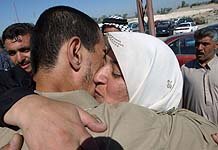 An Iraqi woman kisses her husband soon after his release from Abu Ghraib prison in Baghdad, Iraq, September 15. Hundreds of prisoners were released from Abu Ghraib Wednesday. AP
An Iraqi woman kisses her husband soon after his release from Abu Ghraib prison in Baghdad, Iraq, September 15. Hundreds of prisoners were released from Abu Ghraib Wednesday. AP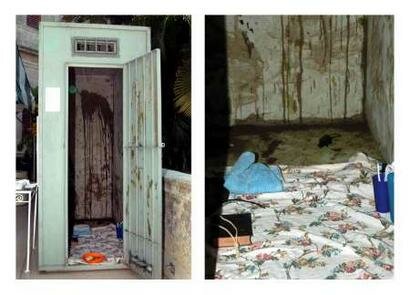 A combo shows two images of a replica of a solitary confinement prison cell, set up at the residence of top U.S. diplomat James Cason in Havana, September 8, 2004.
A combo shows two images of a replica of a solitary confinement prison cell, set up at the residence of top U.S. diplomat James Cason in Havana, September 8, 2004.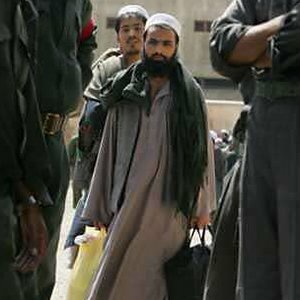 Pakistani prisoners wait for their release as Afghan police stand by the gate of prison in Kabul
Pakistani prisoners wait for their release as Afghan police stand by the gate of prison in Kabul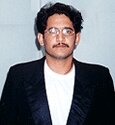 Thursday 9th September 2004 will see a dismal anniversary marked across Australia, with the passing of six years in detention for a 30-year-old man from Indian Kashmir, Peter Qasim.
Thursday 9th September 2004 will see a dismal anniversary marked across Australia, with the passing of six years in detention for a 30-year-old man from Indian Kashmir, Peter Qasim. David Hicks gave his father Terry a detailed account of 10 hours of absolute hell he endured after his capture in Afghanistan in December 2001, it was reported.
David Hicks gave his father Terry a detailed account of 10 hours of absolute hell he endured after his capture in Afghanistan in December 2001, it was reported.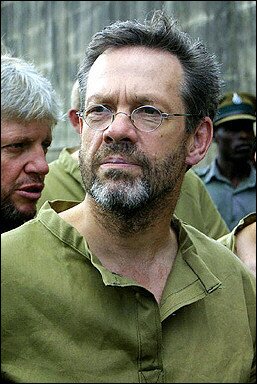 HARARE (AFP) - A court in Zimbabwe found the alleged British coup mastermind Simon Mann guilty of attempting to illegally buy arms to stage a putsch in oil-rich Equatorial Guinea but acquitted 66 other co- accused.
HARARE (AFP) - A court in Zimbabwe found the alleged British coup mastermind Simon Mann guilty of attempting to illegally buy arms to stage a putsch in oil-rich Equatorial Guinea but acquitted 66 other co- accused.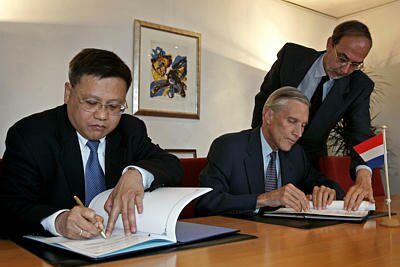 On Monday 23 August, Minister of Foreign Affairs Bernard Bot and Thana Duangratana, the Thai ambassador to the Netherlands, signed a treaty on the exchange of individuals serving prison sentences. Dutch nationals sentenced in Thailand will now be able to serve the rest of their time in the Netherlands, and vice versa. The treaty only applies once an individual has been through the entire legal process.
On Monday 23 August, Minister of Foreign Affairs Bernard Bot and Thana Duangratana, the Thai ambassador to the Netherlands, signed a treaty on the exchange of individuals serving prison sentences. Dutch nationals sentenced in Thailand will now be able to serve the rest of their time in the Netherlands, and vice versa. The treaty only applies once an individual has been through the entire legal process.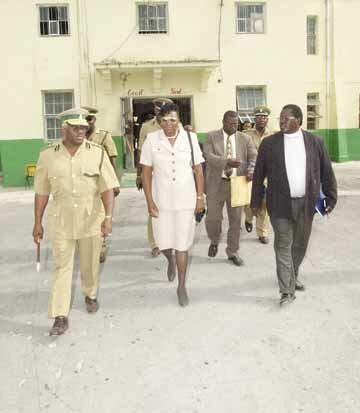 Conditions at Fox Hill Prison have been described as being a "travesty of humanity." Attorney Paul Moss Jr made the charge Wednesday at a press conference just across the street from the institution. Moss, who visited a relative in the prison daily for a month, said that conditions at the prison are "degrading for officer and inmate alike."
Conditions at Fox Hill Prison have been described as being a "travesty of humanity." Attorney Paul Moss Jr made the charge Wednesday at a press conference just across the street from the institution. Moss, who visited a relative in the prison daily for a month, said that conditions at the prison are "degrading for officer and inmate alike."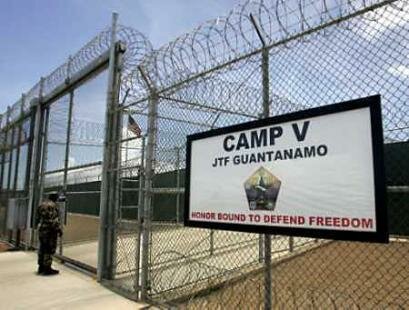 Several legal proceedings are planned or under way for terror suspects held at the U.S. military prison at Guantanamo Bay, Cuba. Since January 2002, the prison population has reached nearly 600 detainees from 40 nations.
Several legal proceedings are planned or under way for terror suspects held at the U.S. military prison at Guantanamo Bay, Cuba. Since January 2002, the prison population has reached nearly 600 detainees from 40 nations.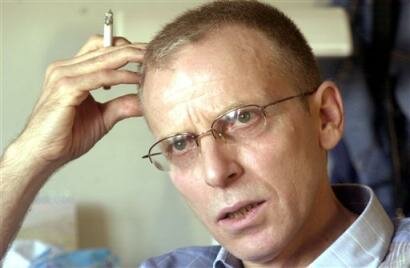 Imad Shiha, 50, who served 30-year-long prison term in Syria, speaks to reporters on Friday, Aug. 6, 2004 in his family home in Rukun ad-Din suburb in the Syrian capital, Damascus. Shiha was released Wednesday as part of a release of 90 political prisoners. (AP Photo Bassem Tellawi).
Imad Shiha, 50, who served 30-year-long prison term in Syria, speaks to reporters on Friday, Aug. 6, 2004 in his family home in Rukun ad-Din suburb in the Syrian capital, Damascus. Shiha was released Wednesday as part of a release of 90 political prisoners. (AP Photo Bassem Tellawi).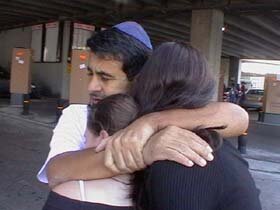 The F.P.S.S is please to announce the results of a successful campaign for Israeli man Efi Elad.
The F.P.S.S is please to announce the results of a successful campaign for Israeli man Efi Elad.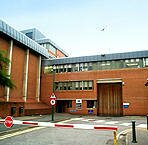 Officers at Holloway prison are cutting down five women a day from nooses, the Guardian has learned, and recently saved one inmate six times in a single night.
Officers at Holloway prison are cutting down five women a day from nooses, the Guardian has learned, and recently saved one inmate six times in a single night.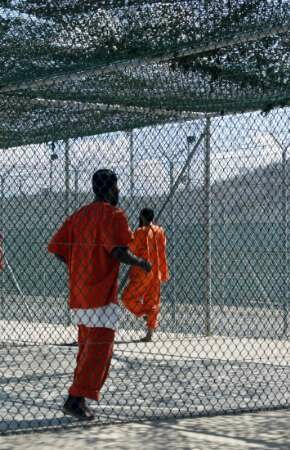 WASHINGTON - For the first time in the nearly three years since the Sept. 11 attacks, a prisoner picked up as a potential terrorist and held nearly incommunicado at a U.S. prison in Cuba got a chance Friday to convince his jailers that he should go free.
WASHINGTON - For the first time in the nearly three years since the Sept. 11 attacks, a prisoner picked up as a potential terrorist and held nearly incommunicado at a U.S. prison in Cuba got a chance Friday to convince his jailers that he should go free.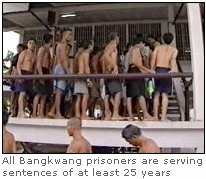 For the first time ever, television cameras have been given access to Thailand's notorious Bangkwang prison, also known in the West as the "Bangkok Hilton".
For the first time ever, television cameras have been given access to Thailand's notorious Bangkwang prison, also known in the West as the "Bangkok Hilton".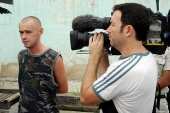 THE bright eyes of youth are already dulled. Head shaved and legs shackled by chains, Michael Connell manages a rueful smile. "Anything can happen to you," he says. "But the biggest fear is not knowing when I'm getting out. What I am very worried about is people forgetting me."
THE bright eyes of youth are already dulled. Head shaved and legs shackled by chains, Michael Connell manages a rueful smile. "Anything can happen to you," he says. "But the biggest fear is not knowing when I'm getting out. What I am very worried about is people forgetting me."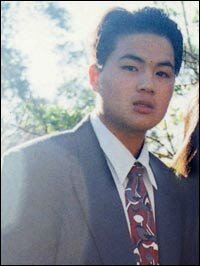 A YOUNG Melbourne man due to hang in Singapore for drug crimes will get one of his last chances to save his life today.
A YOUNG Melbourne man due to hang in Singapore for drug crimes will get one of his last chances to save his life today.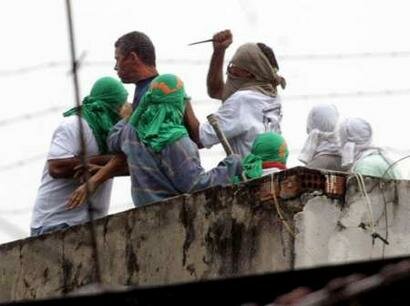 An inmate holds a knife to the back of a hostage on the roof of Frei Caneca Penitentiary complex during rebellion in Rio de Janeiro, July 11, 2004. Special police forces invaded the Frei Caneca Penitentiary complex and they freed five prison guards who were held hostage. Jail riots are common in Brazil's prison system, which is notoriously overcrowded and violent.
An inmate holds a knife to the back of a hostage on the roof of Frei Caneca Penitentiary complex during rebellion in Rio de Janeiro, July 11, 2004. Special police forces invaded the Frei Caneca Penitentiary complex and they freed five prison guards who were held hostage. Jail riots are common in Brazil's prison system, which is notoriously overcrowded and violent.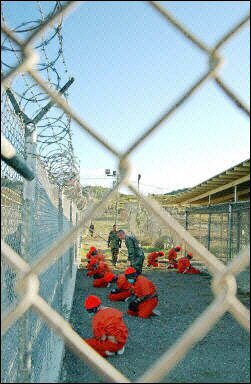 WASHINGTON - All 535 prisoners being held at the Guantánamo Bay prison will be given military hearings to decide whether they are being wrongly held as ``enemy combatants,'' the Pentagon announced Wednesday.
WASHINGTON - All 535 prisoners being held at the Guantánamo Bay prison will be given military hearings to decide whether they are being wrongly held as ``enemy combatants,'' the Pentagon announced Wednesday.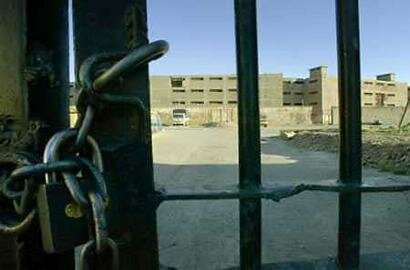 KABUL, Afghanistan - An American general has submitted his report on a network of jails at U.S. bases in Afghanistan where four detainees have died, but only part of his findings will be made public, the military said Wednesday.
KABUL, Afghanistan - An American general has submitted his report on a network of jails at U.S. bases in Afghanistan where four detainees have died, but only part of his findings will be made public, the military said Wednesday.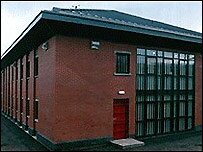 Overcrowding in a hall at a Scottish prison is approaching 100% with three inmates to a cell at times, a report has warned.
Overcrowding in a hall at a Scottish prison is approaching 100% with three inmates to a cell at times, a report has warned.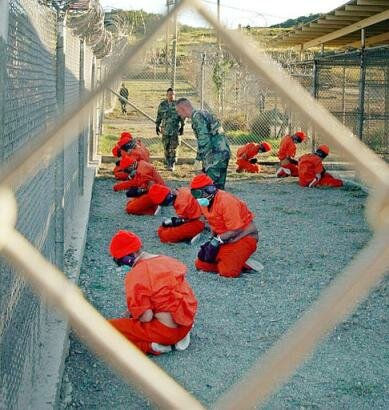
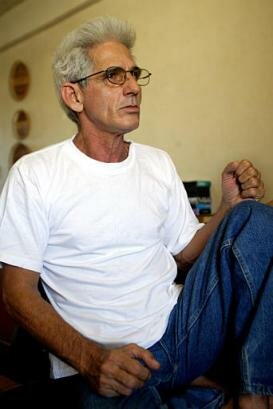 HAVANA (Reuters) - An independent Cuban journalist walked out of prison to become the sixth ailing government opponent freed after a crackdown on dissent last year, opposition sources said on Thursday.
HAVANA (Reuters) - An independent Cuban journalist walked out of prison to become the sixth ailing government opponent freed after a crackdown on dissent last year, opposition sources said on Thursday.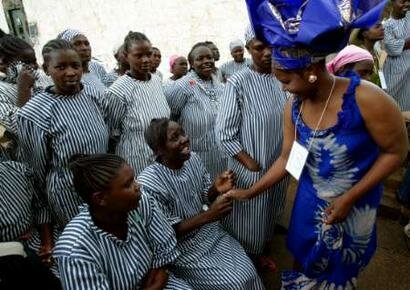 An inmate model is congratulated by fellow inmates during a fashion show as part of a rehabilitation program inside Langata women's prison in Nairobi June 26, 2004. Kenya is aiming to carry out penal reforms aimed at turning prisons into rehabilitation, rather than punishment centers. REUTERS/Radu Sigheti
An inmate model is congratulated by fellow inmates during a fashion show as part of a rehabilitation program inside Langata women's prison in Nairobi June 26, 2004. Kenya is aiming to carry out penal reforms aimed at turning prisons into rehabilitation, rather than punishment centers. REUTERS/Radu Sigheti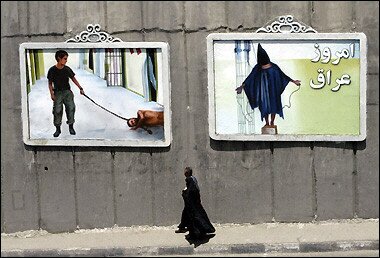 The White House last week re leased hundreds of documents showing that President Bush in sisted that all prisoners captured in Afghanistan be treated humanely, even if they weren't covered by the Geneva Conventions.
The White House last week re leased hundreds of documents showing that President Bush in sisted that all prisoners captured in Afghanistan be treated humanely, even if they weren't covered by the Geneva Conventions.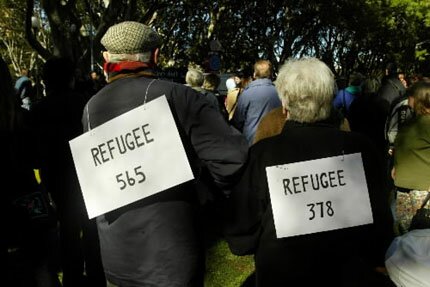 Refugees at South Australia's Baxter detention centre have renamed the facility Abu Ghraib, saying they had suffered similar violence to the Iraqi prisoners.
Refugees at South Australia's Baxter detention centre have renamed the facility Abu Ghraib, saying they had suffered similar violence to the Iraqi prisoners.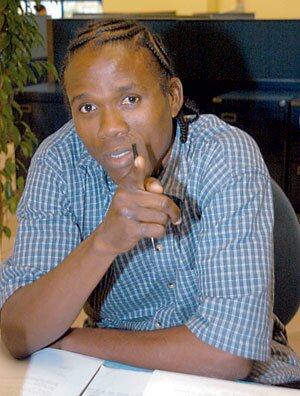 Robert James went to prison a bitter man. After all, he says, he wasn't even guilty of the illegal possession of firearm and shooting with intent charges on which he was convicted. And to add to his anger, he says the police never produced the gun he allegedly fired, accidentally hitting a patron at a stage show at which he performed. "They did not even swab my fingers or anything to see if I had just fired a gun," James tells the Sunday Observer.
Robert James went to prison a bitter man. After all, he says, he wasn't even guilty of the illegal possession of firearm and shooting with intent charges on which he was convicted. And to add to his anger, he says the police never produced the gun he allegedly fired, accidentally hitting a patron at a stage show at which he performed. "They did not even swab my fingers or anything to see if I had just fired a gun," James tells the Sunday Observer.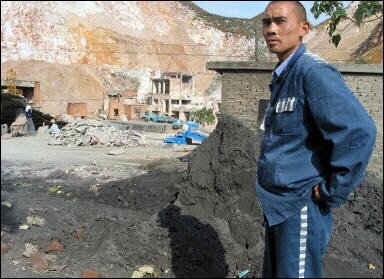 Chinese prisoner looks on at a prison quarry.
Chinese prisoner looks on at a prison quarry.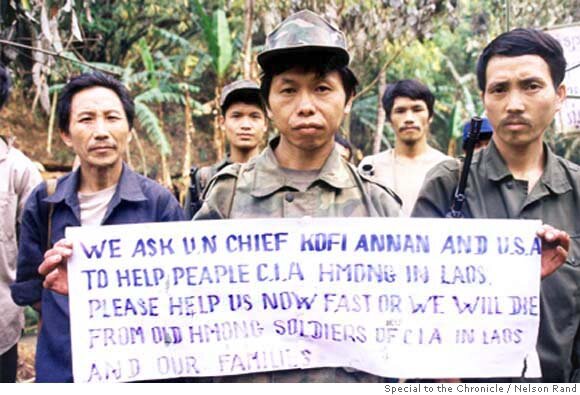 Xaysomboune Special Zone, Laos -- At the age of 12, Moua Toua Ther was recruited by the CIA to fight communism. At 14, he lost his left hand from a bullet wound. At 17, the United States left him with three choices: surrender, flee or fight. He chose the last.
Xaysomboune Special Zone, Laos -- At the age of 12, Moua Toua Ther was recruited by the CIA to fight communism. At 14, he lost his left hand from a bullet wound. At 17, the United States left him with three choices: surrender, flee or fight. He chose the last.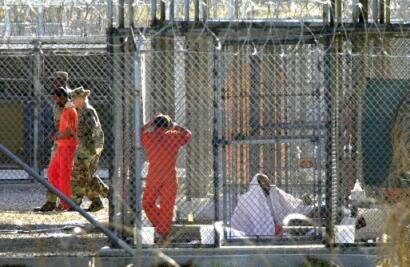 WASHINGTON (Reuters) - The United States is holding terrorism suspects in more than two dozen detention centers worldwide and about half of these operate in total secrecy, said a human rights report released on Thursday.
WASHINGTON (Reuters) - The United States is holding terrorism suspects in more than two dozen detention centers worldwide and about half of these operate in total secrecy, said a human rights report released on Thursday. Khan was 11-years old when she was kidnapped from her home in the hill country of Laos. She was taken to an embroidery factory in Thailand. She and dozens of other children were made to work 14 hours a day for food and clothing. They received no wages.
Khan was 11-years old when she was kidnapped from her home in the hill country of Laos. She was taken to an embroidery factory in Thailand. She and dozens of other children were made to work 14 hours a day for food and clothing. They received no wages. Who will fight for Dawn Marie Wilson?
Who will fight for Dawn Marie Wilson?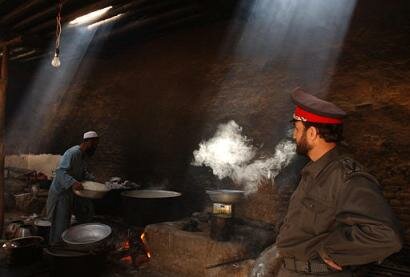 Colonel Abdull Wahed, logistical director of Pol-i Charkhy's prison, writes notes before checking lunch for the more than 300 prisoners of the jail in Kabul, Afghanistan , Monday, May 3, 2004. In the next few days over eight hundreds Taliban and al-Qaida prisoners are going to be transferred from Shibirghan jails in Javsjan province to this Kabul Central Prison, according to a Colonel at the prison. (AP Photo/Emilio Morenatti)
Colonel Abdull Wahed, logistical director of Pol-i Charkhy's prison, writes notes before checking lunch for the more than 300 prisoners of the jail in Kabul, Afghanistan , Monday, May 3, 2004. In the next few days over eight hundreds Taliban and al-Qaida prisoners are going to be transferred from Shibirghan jails in Javsjan province to this Kabul Central Prison, according to a Colonel at the prison. (AP Photo/Emilio Morenatti)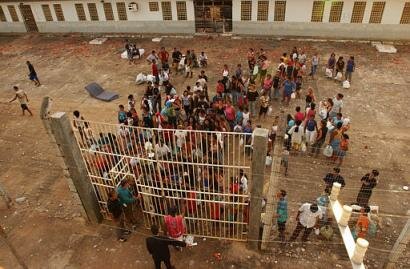 PORTO VELHO, Brazil - Inmates ended a rebellion that left nine people dead at an overcrowded Brazilian prison on Thursday, after authorities agreed to improve conditions.
PORTO VELHO, Brazil - Inmates ended a rebellion that left nine people dead at an overcrowded Brazilian prison on Thursday, after authorities agreed to improve conditions. A 23-year-old British backpacker held in an Indian jail on drug smuggling charges has appeared in court.
A 23-year-old British backpacker held in an Indian jail on drug smuggling charges has appeared in court.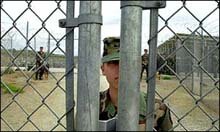 For two years the Tipton Three have been silent prisoners in Guantanamo Bay. Now, in this remarkable interview with David Rose, they describe for the first time the extraordinary story of their journey from the West Midlands to Camp Delta
For two years the Tipton Three have been silent prisoners in Guantanamo Bay. Now, in this remarkable interview with David Rose, they describe for the first time the extraordinary story of their journey from the West Midlands to Camp Delta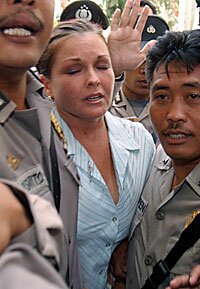 SCHAPELLE Corby whispered tearfully that her "life was over" after an Indonesian prosecutor dropped calls for the death sentence only to demand she spend the rest of her life behind bars in Bali.
SCHAPELLE Corby whispered tearfully that her "life was over" after an Indonesian prosecutor dropped calls for the death sentence only to demand she spend the rest of her life behind bars in Bali. SCHAPELLE Corby's case would not be affected by the arrest of nine young Australians accused of drug smuggling, Foreign Minister Alexander Downer said last night.
SCHAPELLE Corby's case would not be affected by the arrest of nine young Australians accused of drug smuggling, Foreign Minister Alexander Downer said last night.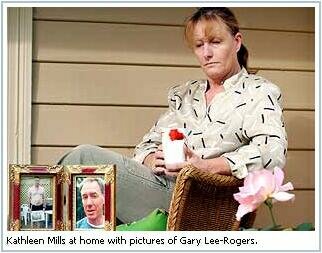 A NOTE by a security official who died mysteriously after alleging drug-running at Sydney Airport has been delivered to lawyers for accused marijuana smuggler Schapelle Corby. They claim the note is evidence supporting Corby's plea that she is an innocent victim of criminal networks using airports for drug trafficking.
A NOTE by a security official who died mysteriously after alleging drug-running at Sydney Airport has been delivered to lawyers for accused marijuana smuggler Schapelle Corby. They claim the note is evidence supporting Corby's plea that she is an innocent victim of criminal networks using airports for drug trafficking. MALABON, PHILIPPINES - A 13-year-old boy crawls out of a curtained, wooden box attached to the wall of a crowded prison cell. Inside the box, an older man reclines, staring out.
MALABON, PHILIPPINES - A 13-year-old boy crawls out of a curtained, wooden box attached to the wall of a crowded prison cell. Inside the box, an older man reclines, staring out.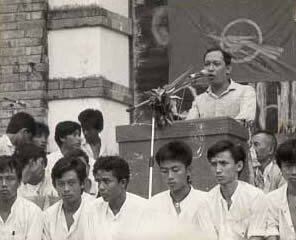 According to his lawyer, U Kyaw Khin, the elected representative (MP) of Shan State capital Taunngyi, was sentenced, a second time, to 14 years imprisonment by a local district court on April 8, 2005. Please see appendix
According to his lawyer, U Kyaw Khin, the elected representative (MP) of Shan State capital Taunngyi, was sentenced, a second time, to 14 years imprisonment by a local district court on April 8, 2005. Please see appendix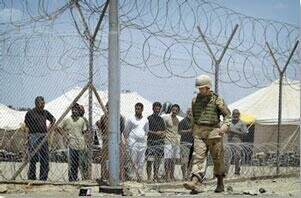 CAMP BUCCA: The International Committee of the Red Cross (ICRC) demanded on Tuesday an investigation into a riot at the US-run Camp Bucca prison camp in southern Iraq.
CAMP BUCCA: The International Committee of the Red Cross (ICRC) demanded on Tuesday an investigation into a riot at the US-run Camp Bucca prison camp in southern Iraq. "When I first came to Indonesia, if anybody would have said that I'd be locked up in an Indonesian jail I would have said they're crazy, it couldn't happen. We're good people, it couldn't happen. But it did happen."
"When I first came to Indonesia, if anybody would have said that I'd be locked up in an Indonesian jail I would have said they're crazy, it couldn't happen. We're good people, it couldn't happen. But it did happen." You're on your way to a country where your language is not spoken. Your luggage is missing--but later found--looted and torn. Your tour guide kindly replaces the torn luggage and you are off to the next airport--only to be arrested, tried and convicted for smuggling heroin in your replacement luggage! Yes, if caught in Malaysia or Singapore, you would most likely be dead, even if you are really innocent.
You're on your way to a country where your language is not spoken. Your luggage is missing--but later found--looted and torn. Your tour guide kindly replaces the torn luggage and you are off to the next airport--only to be arrested, tried and convicted for smuggling heroin in your replacement luggage! Yes, if caught in Malaysia or Singapore, you would most likely be dead, even if you are really innocent. AN Australian couple jailed in Laos for sapphire smuggling have accused the lawyer who secured their freedom of withdrawing money from their company account without consent.
AN Australian couple jailed in Laos for sapphire smuggling have accused the lawyer who secured their freedom of withdrawing money from their company account without consent. A 24-year-old Melbourne man on death row for drug trafficking in Singapore may be thrown a lifeline.
A 24-year-old Melbourne man on death row for drug trafficking in Singapore may be thrown a lifeline.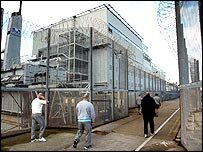 The UK's only prison ship is to close, the Home Office has announced.
The UK's only prison ship is to close, the Home Office has announced.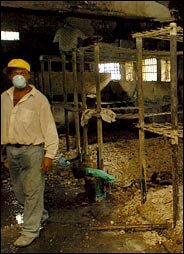 IGÜEY, Dominican Republic, March 8 - Zacaria Martínez is not sure how he survived the fire that swept through his prison cell, packed almost to the roof with inmates, killing nearly everyone inside. The only explanation he has is that it was "at the hands of God."
IGÜEY, Dominican Republic, March 8 - Zacaria Martínez is not sure how he survived the fire that swept through his prison cell, packed almost to the roof with inmates, killing nearly everyone inside. The only explanation he has is that it was "at the hands of God." The US State Department says the Lao government’s human rights record remained poor in 2004, and it continued to commit serious abuses. The government continued to pursue remnant bands of insurgents, resulting in an unknown number of civilian and military casualties. Citizens did not have the right to change their government.
The US State Department says the Lao government’s human rights record remained poor in 2004, and it continued to commit serious abuses. The government continued to pursue remnant bands of insurgents, resulting in an unknown number of civilian and military casualties. Citizens did not have the right to change their government.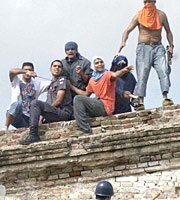 BUENOS AIRES, Argentina (AP) — Hundreds of security forces surrounded an Argentine prison Friday in a tense standoff with 2,000 inmates who overpowered guards, taking about two dozen of them hostage, including the warden. At least eight people were killed.
BUENOS AIRES, Argentina (AP) — Hundreds of security forces surrounded an Argentine prison Friday in a tense standoff with 2,000 inmates who overpowered guards, taking about two dozen of them hostage, including the warden. At least eight people were killed.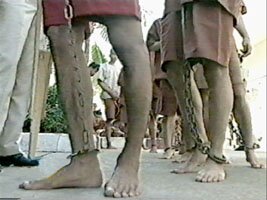 Bangkok, Thailand, Jan. 17 (UPI) -- A Bangkok, Thailand, prison has announced plans to broadcast live video of death row prisoners' final moments over the Internet, the BBC reported Monday. Rights group Amnesty International has said the plan is an infringement of human rights. The group has called on Thai authorities to the plan.
Bangkok, Thailand, Jan. 17 (UPI) -- A Bangkok, Thailand, prison has announced plans to broadcast live video of death row prisoners' final moments over the Internet, the BBC reported Monday. Rights group Amnesty International has said the plan is an infringement of human rights. The group has called on Thai authorities to the plan.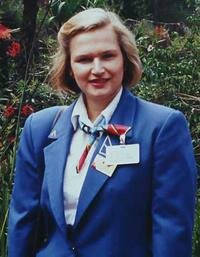 A mentally-ill Australian woman found by Aborigines in a remote Cape York township spent 10 months in immigration detention after a major identification bungle by authorities.
A mentally-ill Australian woman found by Aborigines in a remote Cape York township spent 10 months in immigration detention after a major identification bungle by authorities.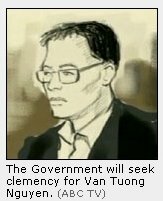 Prime Minister John Howard said today he would ask for clemency for Melbourne man Nguyen Tuong Van who is facing the death penalty in Singapore for heroin trafficking.
Prime Minister John Howard said today he would ask for clemency for Melbourne man Nguyen Tuong Van who is facing the death penalty in Singapore for heroin trafficking.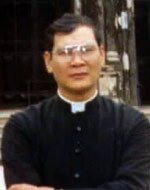 Amnesty International warmly welcomes reports that several prisoners of conscience will be released in the coming days. Those due to be released include Dr Nguyen Dan Que, Nguyen Dinh Huy, Thich Thien Minh and Father Nguyen Van Ly. They are being released as part of a general amnesty for over 8,000 prisoners to mark Tet, the Lunar New Year.
Amnesty International warmly welcomes reports that several prisoners of conscience will be released in the coming days. Those due to be released include Dr Nguyen Dan Que, Nguyen Dinh Huy, Thich Thien Minh and Father Nguyen Van Ly. They are being released as part of a general amnesty for over 8,000 prisoners to mark Tet, the Lunar New Year.
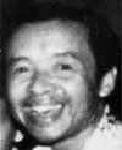 Foreign Prisoner Support Services actively participates in the promotion of world-wide campaigns for the preservation of human rights, as articulated in the Universal Declaration of Human Rights.
Foreign Prisoner Support Services actively participates in the promotion of world-wide campaigns for the preservation of human rights, as articulated in the Universal Declaration of Human Rights. British Citizen Patrick Laughlin, another victim of gross injustice in Japan was released from the notorious Osaka jail on September 4th 2003.
British Citizen Patrick Laughlin, another victim of gross injustice in Japan was released from the notorious Osaka jail on September 4th 2003.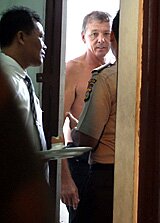 CHRISTOPHER Packer, the Australian sailor being held on weapons charges in a Bali jail, has now offered to assist police in finding a sixth gun that may be on his impounded boat.
CHRISTOPHER Packer, the Australian sailor being held on weapons charges in a Bali jail, has now offered to assist police in finding a sixth gun that may be on his impounded boat. Australia is still reeling in horror as more details emerge of Operation Auxin, Australia's first major crackdown on internet child pornography.
Australia is still reeling in horror as more details emerge of Operation Auxin, Australia's first major crackdown on internet child pornography.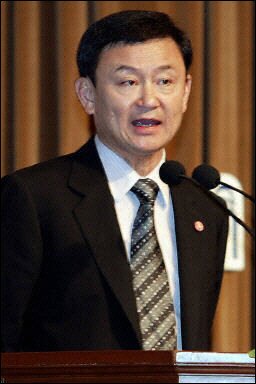 Prime Minister Thaksin Shinawatra praised Thai state security forces after they caused the deaths of 84 protesters who had gathered at a police station in southern Thailand on Monday 25th October. About 2,000 protesters called for the release of 6 Muslim men who had been arrested by Thai police. Police opened fire on the crowd, killing 6 according to some reports. About 1,300 were arrested, loaded into trucks and transported to an army camp. While in custody 78 died, mostly from suffocation.
Prime Minister Thaksin Shinawatra praised Thai state security forces after they caused the deaths of 84 protesters who had gathered at a police station in southern Thailand on Monday 25th October. About 2,000 protesters called for the release of 6 Muslim men who had been arrested by Thai police. Police opened fire on the crowd, killing 6 according to some reports. About 1,300 were arrested, loaded into trucks and transported to an army camp. While in custody 78 died, mostly from suffocation.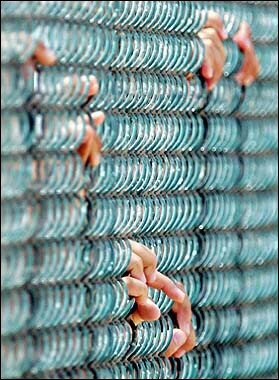 WASHINGTON (AFP) - A new batch of internal FBI documents released took renewed aim at hard interrogation practices at a US military prison in Guantanamo Bay, Cuba, prompting the military to order an investigation into FBI allegations of prisoner abuse there.
WASHINGTON (AFP) - A new batch of internal FBI documents released took renewed aim at hard interrogation practices at a US military prison in Guantanamo Bay, Cuba, prompting the military to order an investigation into FBI allegations of prisoner abuse there.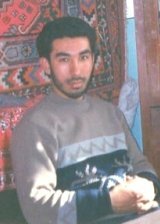 In October 2001, Noorpolat Abdulla, a 31-year-old Australian citizen, was convicted of preparing a terrorist attack in the former Soviet Republic of Kazakhstan, in Central Asia. Denied consular representation, he was sentenced to 15 years in jail by a closed court.
In October 2001, Noorpolat Abdulla, a 31-year-old Australian citizen, was convicted of preparing a terrorist attack in the former Soviet Republic of Kazakhstan, in Central Asia. Denied consular representation, he was sentenced to 15 years in jail by a closed court.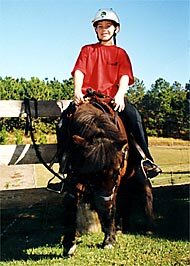 EARLY in the morning, when the dew was still fresh on the grass and the mist was sweeping through the mountains, a small boy would slowly make his way across the paddock, edging forward on his hands and knees. Lying down quietly beside the sleeping horse, he would put his arms around him and whisper: "It's all right, mate, everything's all right, it's only me". The miniature horse scared easily, so the boy woke him the same way every morning, crawling across the paddock to soothe him with gentle words of comfort.
EARLY in the morning, when the dew was still fresh on the grass and the mist was sweeping through the mountains, a small boy would slowly make his way across the paddock, edging forward on his hands and knees. Lying down quietly beside the sleeping horse, he would put his arms around him and whisper: "It's all right, mate, everything's all right, it's only me". The miniature horse scared easily, so the boy woke him the same way every morning, crawling across the paddock to soothe him with gentle words of comfort.
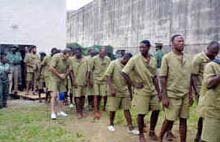 ZIMBABWE officially released 62 foreigners today who were jailed for a year over an alleged coup plot in Equatorial Guinea, but they were kept in a prison complex pending deportation, their lawyer said.
ZIMBABWE officially released 62 foreigners today who were jailed for a year over an alleged coup plot in Equatorial Guinea, but they were kept in a prison complex pending deportation, their lawyer said. ANOTHER Australian has been arrested with drugs in Bali, following in the footsteps of the Bali Nine and Schapelle Corby and prompting denials from Balinese police that Australians have been targeted.
ANOTHER Australian has been arrested with drugs in Bali, following in the footsteps of the Bali Nine and Schapelle Corby and prompting denials from Balinese police that Australians have been targeted.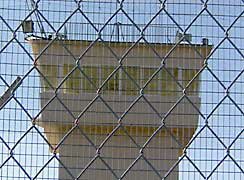 POLICE have moved into Hobart's Risdon Prison following the end of a tense, two-day siege at the maximum security jail.
POLICE have moved into Hobart's Risdon Prison following the end of a tense, two-day siege at the maximum security jail.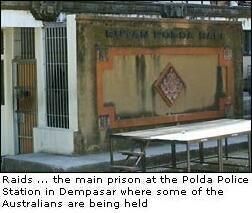 INDONESIAN police have threatened to crack down on foreign journalists covering the Schapelle Corby trial and investigations into the Bali Nine after they accused an Australian TV crew of illegally taping conversations with a suspect.
INDONESIAN police have threatened to crack down on foreign journalists covering the Schapelle Corby trial and investigations into the Bali Nine after they accused an Australian TV crew of illegally taping conversations with a suspect.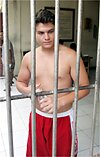 THEY are seduced by glamorous offers of international travel and instant riches - but the reality of a stinking Bali jail cell couldn't be further from the truth.
THEY are seduced by glamorous offers of international travel and instant riches - but the reality of a stinking Bali jail cell couldn't be further from the truth.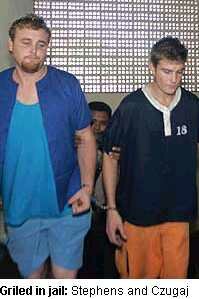 While Schapelle Corby and the Bali nine wait out their future in Denpasar cells, the one certainty is that Canberra has a legal mess on its hands that could unfold on television screens for years.
While Schapelle Corby and the Bali nine wait out their future in Denpasar cells, the one certainty is that Canberra has a legal mess on its hands that could unfold on television screens for years.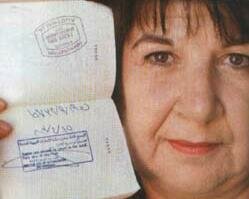 As Schapelle Corby languishes in a Bali prison, businesswoman Yvonne Randall reveals the terror of spending three months in an Arab prison.
As Schapelle Corby languishes in a Bali prison, businesswoman Yvonne Randall reveals the terror of spending three months in an Arab prison.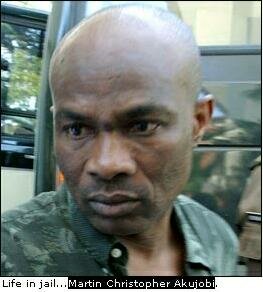 A NIGERIAN-born man was yesterday sentenced in Bali to life in jail for bringing 1.1kg of heroin to the tourist island.
A NIGERIAN-born man was yesterday sentenced in Bali to life in jail for bringing 1.1kg of heroin to the tourist island.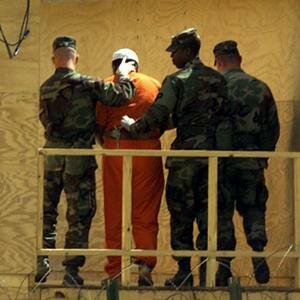 Australia is planning to build a Guantanamo-like prison on Christmas Island
Australia is planning to build a Guantanamo-like prison on Christmas Island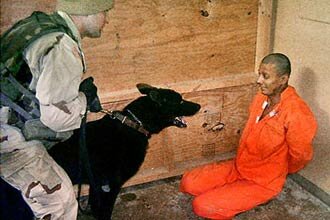 WASHINGTON -- The Defense Department announced Tuesday it transferred two detainees from Guantanamo Bay, Cuba, to the Belgian government.
WASHINGTON -- The Defense Department announced Tuesday it transferred two detainees from Guantanamo Bay, Cuba, to the Belgian government.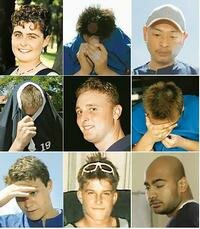
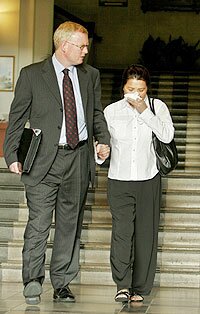
 Many hilltribe men are amongst a substantial number of recent prisoner transfers out of horrendously overcrowded Bangkwang Central Prison just north of Bangkok.
Many hilltribe men are amongst a substantial number of recent prisoner transfers out of horrendously overcrowded Bangkwang Central Prison just north of Bangkok.


